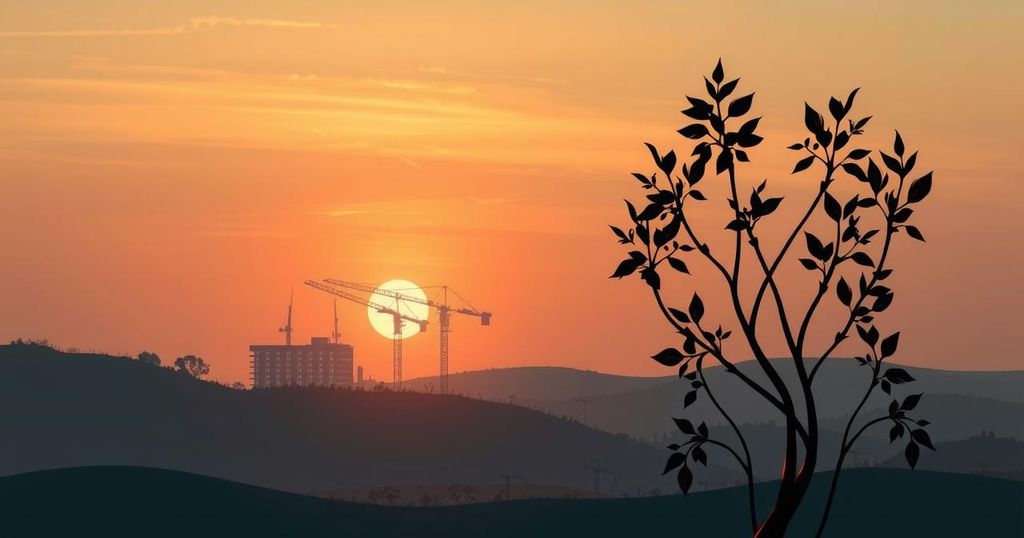Iran denies Israeli claims of funding Hezbollah, calling them unfounded and obstructive to Lebanon’s reconstruction. Baqaei urges global intervention in the West Bank and rejects Trump’s Gaza relocation proposal. Iran backs Syria’s political self-determination and protests the detention of an Iranian cleric in Sweden.
TEHRAN – Iran has firmly rejected Israel’s allegations of financially supporting Hezbollah in Lebanon, asserting that such claims are baseless and intended to undermine Lebanon’s reconstruction post-Israeli aggression. Esmaeil Baqaei, spokesperson for Iran’s Foreign Ministry, articulated during a weekly press conference that these assertions form part of a broader strategy to disrupt Lebanon’s recovery efforts following Israeli attacks.
Following months of conflict, a ceasefire between Israel and Hezbollah was agreed upon last November, resulting in substantial military losses for Israel without achieving its objectives in Lebanon. In response to increasing Israeli military activities in the occupied West Bank, Iran has called for international intervention to avert further violence. Baqaei expressed profound concern regarding persistent violence, particularly in light of a ceasefire in Gaza, highlighting calls from human rights experts regarding a potential genocide in the West Bank.
Baqaei urged world powers to act decisively, stating, “The international community should not allow the normalization of killing,” as he reiterated Iran’s commitment to holding Israeli leaders accountable for their actions, especially regarding the situation in Gaza. He acknowledged the development of a new anti-Israel coalition in the Netherlands focused on pursuing legal actions against Israeli officials linked to the Gaza conflict.
Condemnation was also directed toward former U.S. President Donald Trump’s recent proposal advocating for the relocation of Gaza’s populace to Jordan and Egypt. Baqaei emphasized that the future of Gaza should be determined solely by its residents, stating, “No foreign power has the authority to decide Gaza’s fate—only the Palestinian people can decide their own future.”
Regarding Syria, Baqaei responded to the appointment of Abu Mohammed al-Jolani as Syria’s head, reaffirming Iran’s support for a Syrian government that accurately reflects the wishes of its people. Furthermore, he announced the appointment of Ali Mousavi as Iran’s new ambassador to the United Kingdom during his briefing.
In a separate diplomatic matter, Iran summoned Sweden’s ambassador to protest the detention of Mohsen Hakimollahi, head of the Imam Ali Islamic Center in Stockholm, amid his pending deportation. Baqaei denounced this act as a blatant violation of human rights, conveying Iran’s firm opposition to such actions.
The article discusses recent accusations made by Israel against Iran regarding alleged financial support to Hezbollah, Syria’s political situation, and additional diplomatic issues involving Iran. It highlights Tehran’s rejection of these allegations, concern over violence in the West Bank, the response to international proposals related to Gaza, and comments on the human rights situation concerning an Iranian cleric detained in Sweden. This context underscores the ongoing geopolitical complexities in the region as well as Iran’s foreign policy strategies.
In summary, Iran has categorically rejected Israeli accusations of funding Hezbollah and emphasized the importance of Lebanese reconstruction following Israeli aggression. It has also called for international intervention regarding concerns in the West Bank, condemned proposals for the forced relocation of Gazans, and asserted support for Syrian governance representing its people. Furthermore, diplomatic actions regarding Sweden’s treatment of an Iranian cleric underline Iran’s commitment to protecting its citizens’ rights.
Original Source: www.tehrantimes.com






